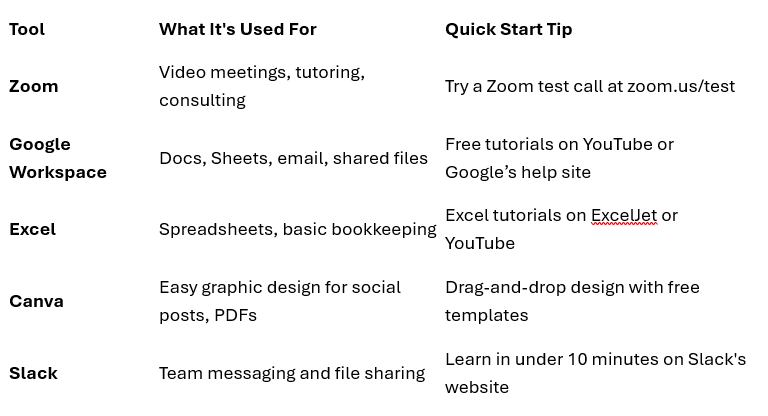Top Remote Jobs for Retirees: Work from Anywhere
May 09, 2025
Looking for remote jobs that work well after retirement?
Here’s a quick summary of what you’ll find in this guide:
- The best remote job types for retirees
- Skills you already have—and how to apply them online
- Where to find legitimate remote work opportunities
- How to avoid scams and stay safe online
- Tips for maintaining work-life balance in retirement
Remote work is no longer just for techies or millennials. It’s a perfect fit for retirees who want to stay mentally sharp, earn extra income, and work from anywhere—without sacrificing flexibility or freedom.
This isn’t about going back to the grind. It’s about finding meaningful, manageable work that enhances your life—not consumes it.
Join your fellow "Retirepreneurs" and receive weekly tips, strategies and resources to be successful in your journey! 👉 Subscribe Now!
Pros and Cons of Remote Work in Retirement
Remote work can be a wonderful part of retirement—if it aligns with your goals, habits, and energy levels. While the benefits are plentiful, it’s helpful to know the trade-offs before diving in.
Let’s take a closer look at what remote work really means for retirees.
Benefits for Retirees
- Flexibility in location and hours
Work from your porch, a favorite vacation spot, or wherever you feel most comfortable. You set the schedule. Whether you want to work a few mornings a week or just pick up short-term projects here and there, remote work molds around your lifestyle—not the other way around. - Low physical strain and no commute
Say goodbye to long drives, standing on your feet, or physically demanding shifts. Most remote jobs are done from a laptop or tablet in the comfort of your home. No traffic, no weather hassles—just log in and go. - Use your experience, not your energy
Remote work lets you leverage your hard-earned knowledge and skills. Whether you’re consulting, writing, tutoring, or doing admin work, you’re valued for your brain—not your brawn. It’s a smart way to stay sharp and share your talents without burnout.
Potential Drawbacks
- Isolation if not balanced with social life
Working from home can feel quiet—sometimes too quiet. If you thrive on interaction, it’s important to balance remote work with social activities like volunteering, joining local groups, or scheduling regular coffee meetups. - Tech learning curve (but it’s solvable)
Yes, you’ll need basic tech comfort: email, Zoom, file sharing, maybe a freelancing platform or two. But don’t let that stop you—there are step-by-step tutorials, free classes at libraries, and even grandkids willing to help. Most retirees pick it up faster than they expect. - Boundaries between home and work
Without a commute to create separation, work can bleed into your free time. Setting simple boundaries—like a dedicated workspace, regular hours, and clear stop times—can help you stay in control.
10 Best Remote Job Types for Retirees
Not all remote jobs are created equal—especially when it comes to retirees looking for flexibility, purpose, and minimal stress. The options below are ideal for second-act lifestyles: you don’t need a degree, full-time availability, or even high-level tech skills to get started.
Here are 10 top choices that fit well with retirees’ real-world experience and preferences:

- Virtual Assistant
Provide admin help to small business owners—respond to emails, schedule appointments, or manage social media. You choose your hours and workload.
- Customer Service Rep
Many companies now hire remote reps to handle support calls or respond to messages. Training is often provided and roles can be part-time.
- Online Tutor
If you enjoy helping others learn, tutoring in subjects like math, English, or SAT prep can be meaningful and rewarding.
- Freelance Writer or Editor
Tap into your communication skills and life experience by writing blog posts, newsletters, or editing documents.
- Consulting in Your Field
Turn your career knowledge into income. Many businesses value seasoned pros for strategic advice on a contract basis.
- Remote Bookkeeping
If you’re detail-oriented and comfortable with numbers, bookkeeping can be a steady and flexible side income.
- Transcription Services
Perfect for quiet workers who enjoy focus and typing. Medical and legal transcription are higher-paying specialties.
- Tech Support or Help Desk
Help others troubleshoot software, apps, or hardware—ideal if you’re confident with tech and enjoy solving problems.
- Remote Sales or Fundraising
Have a gift for persuasion? Many nonprofits and companies hire part-time remote sales reps and fundraisers with flexible hours.
- Online Store / Etsy Seller
Sell handmade crafts, digital downloads, or vintage items. A fun way to turn hobbies into income.
What Skills Do You Need to Succeed in Remote Roles?
One of the biggest myths about remote work is that you need fancy tech skills to succeed. In reality, most retirees already have what it takes—they just need a little digital polish and the confidence to translate their strengths into an online setting.
Let’s break it down.
Transferable Skills from Your Career
You’ve spent decades developing the kinds of soft skills that are in high demand online. Employers and clients value reliability, clarity, and calm under pressure—especially in virtual environments.
Here are just a few strengths you likely already bring to the table:
- Communication – Whether it’s writing emails, leading meetings, or handling customer concerns, your ability to communicate clearly is gold in remote roles.
- Reliability – Showing up on time, meeting deadlines, and staying dependable make you stand out quickly among online freelancers and workers.
- Problem-solving – You’ve handled real-world challenges. That kind of thinking translates well into tech support, project work, and virtual troubleshooting.
- Project management – Organizing tasks, prioritizing deadlines, and keeping things on track—essential in roles like virtual assistance or remote consulting.
- Empathy and people skills – Retirees often bring a level of maturity, patience, and emotional intelligence that helps in customer service, teaching, and team-based roles.
Tools to Learn (With Quick Start Resources)
You don’t need to become a tech wizard—but being familiar with a few basic tools can open doors:

🔧 Where to Learn
- YouTube – Free how-to videos for every tool imaginable
- Skillshare or Udemy – Affordable, guided video courses
- Retirepreneur Tools Hub (coming soon!) – Curated for retirees, step-by-step help without the overwhelm
You already have the core foundation. With just a few modern tools and a bit of practice, you’ll be ready to thrive in the digital workplace.
Where to Find Legit Remote Work Opportunities
The internet is full of work-from-home promises—but not all of them are trustworthy. For retirees, it’s especially important to avoid scammy listings and focus on platforms that offer real, reputable, and retiree-friendly remote jobs.
Below are some of the best places to start your search—with tips to help you stand out and succeed.
Best Platforms for Freelance & Contract Work
These websites connect freelancers and independent workers with clients all over the world. Whether you want to write, tutor, do virtual admin work, or consult in your former field, these platforms offer flexible gigs that let you work on your own terms:
- Upwork – Ideal for professionals offering services like writing, customer support, marketing, or consulting. Start small and build your reputation.
- Fiverr – Good for creative, one-off services like graphic design, resume editing, or voiceover work. You set your price and turnaround time.
- FlexJobs – A paid job board (about $5/week) that screens all postings for legitimacy. Especially useful for part-time or contract roles.
- Freelancer – Broad platform with thousands of projects in everything from tech to translation. You bid on projects that match your skills.
💡 Tip: Create a polished profile with a friendly photo, a short professional bio, and examples of your work or experience. Reliability and clarity matter more than fancy credentials.
Great Sites for Part-Time Jobs or Retiree-Friendly Work
Looking for a steady part-time gig instead of freelancing? These sites post jobs from real companies looking to hire remote workers of all ages:
- Remote.co – Focuses entirely on remote job listings, including customer service, sales, and education roles.
- We Work Remotely – Features curated jobs in marketing, support, and tech—but also entry-level listings.
- Indeed – Use filters like “remote,” “part-time,” and “contract” to narrow your search.
- Niche-specific boards – For example, try Tutor.com for teaching gigs or Belay for bookkeeping/admin jobs.
Leverage Your Own Network
Don’t underestimate the power of personal connections. In fact, referrals often lead to the best first gigs.
- Update your LinkedIn profile to reflect your new interests and availability.
- Join alumni groups, industry associations, or local business chambers.
- Mention to friends and former colleagues that you’re open to freelance or part-time work—many retirees land jobs through word of mouth.
The key is to start small, stay cautious, and focus on building real relationships and reputation.
How to Spot & Avoid Remote Work Scams
Remote work is full of opportunity—but it also attracts scammers. Unfortunately, retirees are often targeted with job offers that sound promising but are designed to steal your money or identity.
The good news? A few simple habits can protect you from almost every scam out there. Let’s walk through the biggest red flags and how to stay safe.
Common Red Flags
Watch for these warning signs when browsing remote job listings:
- Upfront fees
Legitimate employers and clients should never ask you to pay for training, software, or materials before you’ve started a job. If someone says you need to “buy in,” walk away. - Vague job descriptions
Scammers often use broad promises like “make $5,000 a week from home” without any details about the work. If the job sounds too good to be true or lacks clarity—it probably is. - Pressure to act fast
If you're being told you must sign up or send money right away, it's a red flag. Real employers give you time to think, research, and ask questions. - Requests for personal information too early
Be cautious if a “recruiter” wants your Social Security number, bank info, or a photo of your ID before you’ve had a formal interview or signed anything official. - Emails from free domains
Reputable companies use professional email addresses (like @companyname.com), not Gmail or Yahoo accounts.
Trusted Resources to Verify Employers
Before applying to or accepting any remote role, check the company’s reputation:
- Better Business Bureau (BBB.org) – Look up company names for complaints or scams.
- Glassdoor.com – See reviews from real employees or contractors.
- Reddit.com/r/Scams – A community that frequently posts and exposes fake jobs or suspicious listings.
- Retirepreneur Scam Checklist – [Download PDF] to help you evaluate any remote job opportunity with confidence.
🛡️ Pro Tip: Trust your gut. If something feels off, take a pause and do a little digging before moving forward. It’s better to miss a real opportunity than to fall for a fake one.
Creating Work-Life Balance in Your Remote Retirement Role
Remote work can easily blend into your daily life—which is both a blessing and a potential trap. Just because you can work from sunrise to sunset doesn’t mean you should. In retirement, the goal is to create a flexible lifestyle that blends productivity with purpose, rest, and enjoyment.
Here’s how to design a remote work routine that supports your health, happiness, and freedom.
Set Boundaries & Routines
One of the biggest adjustments to remote work is learning to set limits—on your time, space, and availability.
- Create a designated workspace
Whether it’s a quiet corner, a desk in the guest room, or even your back porch—having a “work zone” helps your brain switch into productivity mode. When you leave it, you’re done for the day. - Establish clear work hours
Even if it’s just two mornings a week, stick to a routine. Predictability helps reduce stress, improves focus, and prevents work from taking over your life. - Schedule breaks and unplug time
Add regular pauses to stretch, walk the dog, or enjoy a hobby. Take a full lunch away from your screen. And once the day ends, turn off notifications so you can be present with family or enjoy your evening. - Use a weekly planner
A simple paper calendar or digital tool like Google Calendar can help you visualize your week and ensure you’re balancing work with fun and rest.
Stay Social & Mentally Engaged
Remote work can be surprisingly isolating if you’re not intentional about social connection.
- Join online communities or coworking groups
Sites like Focusmate, Workfrom, or even Facebook Groups for freelancers can help you feel connected and supported. - Volunteer in your spare time
Combine meaningful service with real-world social interaction. Many retirees volunteer in their community or take on short-term roles that offer both purpose and people. - Travel and work intentionally
If you enjoy exploring, consider remote jobs you can take with you. Book an Airbnb for a week, work in the mornings, and explore in the afternoons.
Remote work in retirement should serve you—not the other way around. Build a routine that supports your second act and keeps joy front and center.
Next Steps: Start Small, Stay Curious, and Keep It Fun
Remote work in retirement isn’t a full-time commitment - it’s an opportunity to explore, experiment, and enjoy new ways to stay active and earn on your terms.
The beauty of this second act is that you’re in control. There’s no one right way to get started—just the next right step for you.
Here’s how to ease in:
- Choose one job type to explore
Think about your natural strengths, interests, and comfort level with technology. Start with one job path that feels exciting or easy to try—like virtual assistance, tutoring, or consulting in your field. - Set a short-term goal
Whether it’s making your first $100 online, applying to three remote listings, or learning a new tool like Zoom—small goals create momentum without overwhelm. - Use our Getting Started Remote Work Guide
We’ve created a simple checklist to walk you through everything from setting up your profile to finding your first client. It’s beginner-friendly and tailored specifically for retirees. [Download the free guide here]
✅ Frequently Asked Questions
What are the best remote jobs for retirees in 2025?
Top choices include virtual assistant, freelance writing, bookkeeping, customer support, and online tutoring. These roles offer flexibility, low stress, and minimal learning curves.
Can I work from home without advanced tech skills?
Absolutely. Many remote jobs—like data entry, phone-based customer service, or virtual assistant work—require basic computer use only. Some companies also provide training for retirees.
How do I avoid remote job scams targeting seniors?
Stick with reputable platforms like FlexJobs, Indeed, or LinkedIn. Be cautious of jobs that require upfront payments, ask for personal banking info, or seem too good to be true.
Do remote jobs affect Social Security benefits?
If you're below full retirement age, income from remote work could temporarily reduce your benefits. After reaching full retirement age, you can earn unlimited income with no penalty.
People Also Ask: What are the best work-from-home jobs for retirees?
The best remote jobs for retirees are flexible, low-pressure roles like freelance services, virtual assistance, tutoring, and customer support—especially those that let you set your own schedule.
Related Posts:


